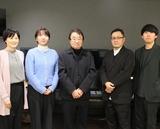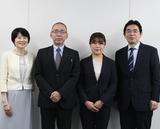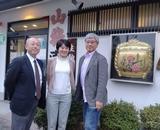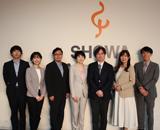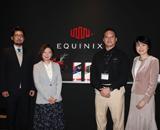February 2015
Accenture's CMI Yoshimitsu Kaji: The Future of Japan from the Perspective of a Businessman/Government Official
In February 2014, Mr. Yoshimitsu Kaji took up a new position as Chief Marketing Innovator (CMI) at Accenture Japan Ltd. Before that, he had worked for Fuji Bank and an advertising company and completed an MBA program at Northwestern University's Kellogg School of Management. After playing an active role in famous firms such as Coca-Cola (Japan) Co., Ltd., Time Warner Inc., Sony Pictures Entertainment (Japan) Inc., and Nissan Motor Co., Ltd., he left his position at Nissan Motor Co., Ltd. to become the Executive Director of the 2016 Tokyo Olympics and Paralympics Bid Committee. Later, he became an international public relations councilor at the Prime Minister's Official Residence, worked in Japanese- and foreign-capital groups, and has built a strong career in linking Japan to the world, both in government and private businesses. Currently an adviser at the Ministry of Education, Culture, Sports, Science and Technology (MEXT), he is also the president of the Kellogg School of Management alumni club, Kellogg Club of Japan.
With his current position as CMI as a starting point, we will ask Mr. Kaji his views and thoughts.
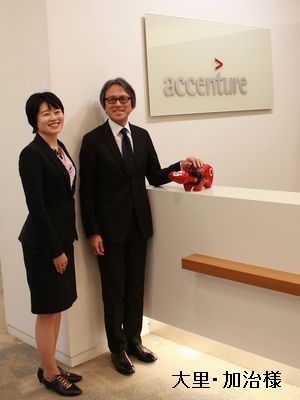
- Profile
- Yoshimitsu Kaji: Chief Marketing Innovator, Accenture Japan Ltd.
- Mariko Ohsato: CEO & President, Arc Communications Inc.
From International Public Relations Councilor at the Prime Minister's Official Residence to a Private Company. Why Accenture?
Ohsato: You have built up a long career in a wide array of industries, ranging from positions in Japanese- and foreign-capital companies, government and private businesses. What made you choose Accenture this time?
Kaji: In 2011, I was an international public relations councilor at the Prime Minister's Official Residence. In March that year, Japan was hit by the Great East Japan Earthquake. At that time, I had the opportunity to work with an excellent strategic consulting company, and I experienced the mutually complementary relationship between government officials and consultants. With, respectively, one following governmental theories to carry out a work of highly public nature, and the other working at logically persuading people from an objective market point of view. It's probably around that time that I thought it could be good to work as a consultant toward improving Japan and the world.
The Thoughts of CMI Mr. Kaji
Ohsato: Presently, you job title is Chief Marketing Innovator, but isn't the normal title Chief Marketing Officer (CMO)? I was wondering if you might have coined that one. (Laughs)
Kaji: It is a title that takes getting used to, and as you guessed, it is a coined word. But unfortunately I didn't come up with it. (Laughs) My role now is to help further enhance Accenture's brand value in Japan. I consulted with Accenture's managerial staff, and the mission that came along with this title was to go past technical aspect and innovate from the perspective of customers and the market. Then, we discussed the title and decided that combining the "marketing" and "innovation" concepts was more fitting than simply using the CMO title.
Ohsato: In Japan, the idea of "innovation" is usually intertwined with "technical innovation," but that doesn't apply in this case, does it?
Kaji: Indeed. This notion apparently comes from the English word "innovation" being translated by "gijutsu kakushin" (technical innovation) in the yearly periodic Keizai Hakusho (lit. The Economic White Paper) in 1956. Yet, obviously, the essence of innovation isn't restricted to technical innovation. For instance, it is well understood that the innovation consisting in purchasing, owning and using an iPod or an iPhone doesn't simply lie on its technical aspect: this innovation came from Steve Job's wanting such a product, considering the advantages of living that way, and shaping these ideas by combining several preexisting technologies. Marketing is known as one of companies' fundamental features. In today's relentlessly changing society, it is crucial to interlock marketing in its traditional form with innovation, so as to create constant added value to the market. The title CMI was also chosen with this idea in mind, and also as a way to always keep me reminded of my task.
Ohsato: You seem to apply marketing innovations to your immediate surroundings one after another. Even for Kellogg Graduate School of Management alumni meetings, you opened the Kellogg alumni only lectures to an external audience by collaboration with Academy Hills, hence increasing their added value. So that titles really fits you like a glove!
What Makes Accenture Stand Out as a Consulting Company
Ohsato: What is it like to work at Accenture?
Kaji: When I first decided to join Accenture, I was asked about what caught my interest. I answered, "If you compare Accenture to a person, it would be the brains and the body, as well as the nervous system that operates them. It is the single consulting company to possess all these qualities at the same time, and that feels most fitting to me." Since actually becoming a member of Accenture, I feel that it is exactly the type of company I had in mind.
Ohsato: It's true, being able to carry out services from strategic decisions and system architecture to the actual implementation of those strategies makes Accenture stand well apart from other consulting companies.
Kaji: For example, conducting initiatives like starting a joint-venture company with a customer and solving a multitude of digital age-related issues feels like you're creating a whole new business value. In a way, it's like being exceptionally dynamic on a job with a big social impact. Accenture proposes four types of services - strategy, digital, technology and operations - and I think it's the only company to provide such high standard services in four fields in such an integrated way.
Ohsato: I felt extremely happy when I heard that Japan stood out as a growth market among the 56 countries Accenture is operating in.
Kaji: Accenture engages in a variety of "digital" and "global" businesses, which we consider to be our most important themes. The rapid progress of digitalization has started to exert a great influence on the business world we are in, and the competitive environment of the market is beginning to undergo vast transformations. Moreover, from a "globalization" perspective, I believe that holding the 2020 Olympic/Paralympic Games will not only increase the importance of outbound business, but that of inbound activities too. Japan hasn't yet reached maturity and there is still room for growth with regards to digitalization and globalization.
Ohsato: In the context of globalization, inbound as well as outbound activities will indeed become more important. Could you tell us more about your own marketing activities?
Kaji: Of course. As the CMI for Japan in a global company, I obviously handle Japan-centric marketing activities, but as for the global side of our activities, presenting the attraction and qualities of Japan is another important task. To do so, I have to use commonly used world-standard indexes such as ROI and KPI, and make these explanations in the world's common language, English. To globalize Japanese companies, we are confronted to a situation where we have to seize the international protocols while emphasizing the appealing aspects of Japan. We have to put these rules in practice even in global companies such as Accenture, and I want to contribute to elevating Japan's value.
Ohsato: Accenture holds the 44th position in brand consulting company Interbrand's Best Global Brands ranking. With top spots mostly being occupied by B2C companies such as Apple, Google and Coca-Cola, Accenture has reached quite an impressive position for a B2B company.
Kaji: Accenture doesn't own the strength of its brand only to a part of the managerial staff and various marketing organizations. All of the following elements put together are what allowed Accenture to build such a healthy corporate brand: the diversified skills and working methods of every consultant who works directly with customers, the business values and processes used to reach them that are provided to our private business and governmental customers, Accenture's corporate social responsibility, and the worldwide consistency of our interactions with all our stakeholders. Therefore, the role of marketing is, by constructing and managing this structure, and communicating with all our stakeholders, to change our current trajectory toward even better recognition and actions. Then, even in an age when things change so fast, it is important to maintain our image as a brand with values. And to accomplish this, I think marketing requires us to innovate by taking initiatives to evolve.
Also, even though Accenture is indeed a B2B company, in order to speed up its development in Japan, we have high expectations of establishing ourselves as a platform for a many skilled members of staff to play an active role on the global scene. Accordingly, to further increase people's interest in Accenture, a B2C type of branding is also necessary in a variety of areas. Accenture's level of recognition in Japan is low compared with the place it holds in the rest of the world: there is still room for development and it is worth working on it.
Feature Interview Index

